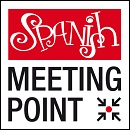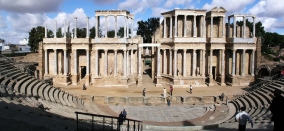Spanish schools and accommodation to study Spanish in Spain
Recent posts
Last schools
introduced
introduced
0 Accommodation

1 Spanish schools

Learning Spanish in Merida. The tourist guide to study your Spanish course.
Study Spanish in Merida, a major representative of the Roman Empire reach throughout Europe.
General Information. 57,000 inhabitants. 345 kilometres southeast of Madrid. It is the capital of the Autonomous Community of Extremadura, and is situated at the confluence of the Guadiana River and the Albarregas River. Merida was founded in 25 BC with the name of Colonia Iulia Augusta Emerita. During Roman times it was an important legal, economic, military and cultural centre. Nowadays, apart from being the administrative capital of Extremadura, Merida is an important tourist destination due to its fascinating archaeological remains and monuments, and the city is conveniently located midway between Madrid and Lisbon and between Salamanca and Seville. It is home to one of the campuses of the University of Extremadura, which offers a range of degree courses including nursing, topography, telematics, industrial design and computer science. Merida is a very attractive place to study Spanish with some language schools offering a wide range of courses.
Surrounding Areas. Cáceres (76 kilometres), a UNESCO World Heritage Site since 1986, possesses one of the most complete medieval urban ensembles in the world; Trujillo (90 kilometres), birthplace of conquerors and famous for its monuments; Guadalupe (125 kilometres), whose Royal Monastery of Saint Mary (Real Monasterio de Santa María) was declared a UNESCO World Heritage Site in 1993.
World Heritage Site. The Archaeological Ensemble of Merida has been a UNESCO World Heritage Site since 1993.
Main Sights. The entire old town is a monument. It is worth highlighting: the Roman Theatre, constructed in 16-15 BC; the Roman Amphitheatre and the Roman Circus, dating from 25 BC, which were created for the benefit of retired soldiers; Saint Lazarus Aqueduct; the Temple of Diana; and Trajan's Arch.
Culture. Merida hosts a wide range of festivals: the Merida Festival (July and August), a long-running classical theatre event; the European Youth Festival of Greco-Roman Theatre (Festival Juvenil Europeo de Teatro Grecolatino), held in April; the heavy metal Via de la Plata Festival (July); the Festival de Cine Inédito (December), devoted to independent films. There are also numerous museums: the National Museum of Roman Art, with important archaeological remains dating from Roman times; the Museo Abierto de Mérida, an interpretation centre focusing on the Merida's history and most famous monuments; the Juan de Ávalos Museum; the Extremadura Geology Museum, situated in the old Moorish citadel (Alcazaba); and the Railway Museum (Museo del Ferrocarril). The monuments are a major attraction for the many students who decide to study Spanish in Merida.
Shopping. The biggest concentration of shops can be found in and around Calle Santa Eulalia. There are also two shopping centres: La Cochera and El Foro.
Gastronomy. The best parts of town for sampling the local tapas are the old quarter and the area bordered by Plaza de España, Calle John Lennon, the Forum and the Roman Theatre. The typical dishes of Merida are zorongollo (red pepper salad), gazpacho extremeño (a regional variation on the famous chilled tomato and vegetable soup, to which pieces of ham are added before serving,) ajoblanco (a creamy white garlic-based version of gazpacho), migas extremeñas (fried breadcrumbs), caldereta de cordero (stewed lamb with red peppers) and conejo a la emeritense (a traditional rabbit stew). During your stay in Spain you can learn to cook some of these dishes. Among the characteristic products of this province and the region as a whole, the following deserve a special mention: dry-cured ham and sausages, cheeses, olive oils and wines. The area also prides itself on a breed of livestock called Retinta, renowned for producing tender, fine-grained veal with a distinctive red colour.
Sports. Merida is well-equipped for a wide range of sports, including football, basketball, handball, canoeing, swimming and athletics. The main facilities are the Estadio Romano, the local football stadium, the Ciudad Deportiva, a modern multi-sport complex, the Alberregas and Guadiana gardens, the Velódromo Albarregas, and three sports centres: Diocles, La Paz and Las Abadías. The Don Tello golf club is located on the outskirts of Merida (8 kilometres).
Fiestas. Both the Roman Carnival (February) and Holy Week (March-April) are considered Events of Regional Tourist Interest. The September Fair, which takes place at the beginning of the month, is the most important popular fiesta, with huge numbers of people gathering in Calle John Lennon and the nearby fairground.
Transport. Merida is situated on the main road that runs between Madrid and Lisbon. There is also a railway line linking the city to Badajoz and Cáceres and, via the latter, to Madrid. It is easy to get from Merida to other Spanish cities
Nightlife. Students who decide to study Spanish in Merida will discover a very active nightlife. Besides the abovementioned tapas areas, the most popular meeting place for a night out is the café-bar called Sala Caramel. Later on the partying continues at El Foro, a shopping centre with a number of lively nightspots.
General Information. 57,000 inhabitants. 345 kilometres southeast of Madrid. It is the capital of the Autonomous Community of Extremadura, and is situated at the confluence of the Guadiana River and the Albarregas River. Merida was founded in 25 BC with the name of Colonia Iulia Augusta Emerita. During Roman times it was an important legal, economic, military and cultural centre. Nowadays, apart from being the administrative capital of Extremadura, Merida is an important tourist destination due to its fascinating archaeological remains and monuments, and the city is conveniently located midway between Madrid and Lisbon and between Salamanca and Seville. It is home to one of the campuses of the University of Extremadura, which offers a range of degree courses including nursing, topography, telematics, industrial design and computer science. Merida is a very attractive place to study Spanish with some language schools offering a wide range of courses.
Surrounding Areas. Cáceres (76 kilometres), a UNESCO World Heritage Site since 1986, possesses one of the most complete medieval urban ensembles in the world; Trujillo (90 kilometres), birthplace of conquerors and famous for its monuments; Guadalupe (125 kilometres), whose Royal Monastery of Saint Mary (Real Monasterio de Santa María) was declared a UNESCO World Heritage Site in 1993.
World Heritage Site. The Archaeological Ensemble of Merida has been a UNESCO World Heritage Site since 1993.
Main Sights. The entire old town is a monument. It is worth highlighting: the Roman Theatre, constructed in 16-15 BC; the Roman Amphitheatre and the Roman Circus, dating from 25 BC, which were created for the benefit of retired soldiers; Saint Lazarus Aqueduct; the Temple of Diana; and Trajan's Arch.
Culture. Merida hosts a wide range of festivals: the Merida Festival (July and August), a long-running classical theatre event; the European Youth Festival of Greco-Roman Theatre (Festival Juvenil Europeo de Teatro Grecolatino), held in April; the heavy metal Via de la Plata Festival (July); the Festival de Cine Inédito (December), devoted to independent films. There are also numerous museums: the National Museum of Roman Art, with important archaeological remains dating from Roman times; the Museo Abierto de Mérida, an interpretation centre focusing on the Merida's history and most famous monuments; the Juan de Ávalos Museum; the Extremadura Geology Museum, situated in the old Moorish citadel (Alcazaba); and the Railway Museum (Museo del Ferrocarril). The monuments are a major attraction for the many students who decide to study Spanish in Merida.
Shopping. The biggest concentration of shops can be found in and around Calle Santa Eulalia. There are also two shopping centres: La Cochera and El Foro.
Gastronomy. The best parts of town for sampling the local tapas are the old quarter and the area bordered by Plaza de España, Calle John Lennon, the Forum and the Roman Theatre. The typical dishes of Merida are zorongollo (red pepper salad), gazpacho extremeño (a regional variation on the famous chilled tomato and vegetable soup, to which pieces of ham are added before serving,) ajoblanco (a creamy white garlic-based version of gazpacho), migas extremeñas (fried breadcrumbs), caldereta de cordero (stewed lamb with red peppers) and conejo a la emeritense (a traditional rabbit stew). During your stay in Spain you can learn to cook some of these dishes. Among the characteristic products of this province and the region as a whole, the following deserve a special mention: dry-cured ham and sausages, cheeses, olive oils and wines. The area also prides itself on a breed of livestock called Retinta, renowned for producing tender, fine-grained veal with a distinctive red colour.
Sports. Merida is well-equipped for a wide range of sports, including football, basketball, handball, canoeing, swimming and athletics. The main facilities are the Estadio Romano, the local football stadium, the Ciudad Deportiva, a modern multi-sport complex, the Alberregas and Guadiana gardens, the Velódromo Albarregas, and three sports centres: Diocles, La Paz and Las Abadías. The Don Tello golf club is located on the outskirts of Merida (8 kilometres).
Fiestas. Both the Roman Carnival (February) and Holy Week (March-April) are considered Events of Regional Tourist Interest. The September Fair, which takes place at the beginning of the month, is the most important popular fiesta, with huge numbers of people gathering in Calle John Lennon and the nearby fairground.
Transport. Merida is situated on the main road that runs between Madrid and Lisbon. There is also a railway line linking the city to Badajoz and Cáceres and, via the latter, to Madrid. It is easy to get from Merida to other Spanish cities
Nightlife. Students who decide to study Spanish in Merida will discover a very active nightlife. Besides the abovementioned tapas areas, the most popular meeting place for a night out is the café-bar called Sala Caramel. Later on the partying continues at El Foro, a shopping centre with a number of lively nightspots.
© TEXT: SPANISH IN TOUR.
VIDEO: Patronato de Turismo de Mérida
VIDEO: Patronato de Turismo de Mérida

























